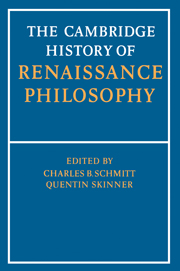Book contents
- Frontmatter
- Introduction
- PART 1 THE INTELLECTUAL CONTEXT
- 1 The conditions of enquiry: Manuscripts
- 2 The conditions of enquiry: Printing and censorship
- 3 The Renaissance concept of philosophy
- 4 Translation, terminology and style in philosophical discourse
- 5 Humanism
- PART 2 PHILOSOPHY AND ITS PARTS
- PART 3 SUPPLEMENTARY MATERIAL
- Biobibliographies
- Bibliography
- Index nominun
- Index rerum
- References
3 - The Renaissance concept of philosophy
from PART 1 - THE INTELLECTUAL CONTEXT
Published online by Cambridge University Press: 28 March 2008
- Frontmatter
- Introduction
- PART 1 THE INTELLECTUAL CONTEXT
- 1 The conditions of enquiry: Manuscripts
- 2 The conditions of enquiry: Printing and censorship
- 3 The Renaissance concept of philosophy
- 4 Translation, terminology and style in philosophical discourse
- 5 Humanism
- PART 2 PHILOSOPHY AND ITS PARTS
- PART 3 SUPPLEMENTARY MATERIAL
- Biobibliographies
- Bibliography
- Index nominun
- Index rerum
- References
Summary
THE ORIGINS OF RENAISSANCE PHILOSOPHY: SCHOLASTIC THOUGHT AND THE NEEDS OF A NEW CULTURE
Any approach to the meaning of philosophy in the Renaissance requires some preliminary qualification and explanation. How far, for instance, is it permissible to speak of a specifically Renaissance philosophy – a philosophy that might be said to reflect the growing complexity of intellectual activity in this particular historical situation? May the term be applied to ways of thinking which, though current in the fifteenth and sixteenth centuries, perpetuate typically medieval thinking? Do the speculative currents which emerged in the mid thirteenth century, above all in Italy, represent continuity or a break with the past? How closely are scholastic natural philosophy and logic connected with the scientific revolution? Was ‘humanist rhetoric’ an obstacle to what might otherwise have been a swift and linear development? The historical significance of many of the issues discussed in this volume cannot be assessed without considering those social factors, which shattered the ideological unanimity of western Christianitas in the thirteenth century, emphasising the difference rather than the similarities between intellectual centres and ushering in new ways of thought. There is little point in trying to define the Renaissance concept of philosophy if no heed is paid to the cultural institutions emerging outside the universities, the social class and status of their members, their aims, their rivalries and their audiences. From the early fourteenth century there was a complex interaction between scholasticism and humanism with the former profiting from the methodological and linguistic advances made by the latter.
- Type
- Chapter
- Information
- The Cambridge History of Renaissance Philosophy , pp. 55 - 74Publisher: Cambridge University PressPrint publication year: 1988
References
- 6
- Cited by



